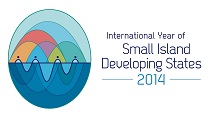 24 February 2015: Speakers reflected on the International Year of Small Island Developing States (SIDS) at a closing ceremony, noting the Year’s efforts to raise awareness of SIDS’ contributions to the global community, their resilience, their cultural heritage and the special challenges faced by SIDS in achieving sustainable development, including climate change and sea level rise, vulnerability to external shocks, and degradation of their biodiversity and marine resources. Many speakers discussed SIDS within the context of the post-2015 development agenda, the Third International Conference on Financing for Developing (FfD 3) and climate change negotiations.
24 February 2015: Speakers reflected on the International Year of Small Island Developing States (SIDS) at a closing ceremony, noting the Year’s efforts to raise awareness of SIDS’ contributions to the global community, their resilience, their cultural heritage and the special challenges faced by SIDS in achieving sustainable development, including climate change and sea level rise, vulnerability to external shocks, and degradation of their biodiversity and marine resources. Many speakers discussed SIDS within the context of the post-2015 development agenda, the Third International Conference on Financing for Developing (FfD 3) and climate change negotiations.
The event included a panel discussion on ‘SIDS issues as global issues: Positioning SIDS in the Post-2015 Development Agenda,’ which addressed how the implementation of the SAMOA Pathway will benefit from and strengthen the post-2015 development agenda and the FfD process.
The SAMOA Pathway, the outcome document from the Third International Conference on SIDS, is SIDS’ contribution to the post-2015 agenda process and should be fully integrated into the post-2015 outcomes, declared the “SIDS Champions”: Juliette Rosita Riley, Charge d’Affaires of Barbados, on behalf of Joseph Goddard, Barbados, representing the Caribbean region; Ronald Jumeau, Seychelles, representing the Africa, Indian Ocean, Mediterranean and South China Sea region (AIMS); and Jane Chigiyal, Federated States of Micronesia (FSM), representing the Pacific region. The Permanent Representative of the Maldives and Chair of the Alliance of Small Island States (AOSIS), Ahmed Sareer, and other speakers also called for integrating the SAMOA Pathway in the post-2015 agenda.
The Year and the Conference “marked starting points rather than culminations,” said Wu Hongbo, Under-Secretary-General for Economic and Social Affairs. He emphasized that the UN Department of Economic and Social Affairs (DESA) and other UN entities will continue to work to ensure the implementation of the SAMOA Pathway and the partnerships launched at the Conference, as well as to ensure that SIDS’ priorities feed into the Third World Conference on Disaster Risk Reduction (DRR), FfD 3, the Summit to adopt the post-2015 development agenda, and the Paris Climate Change Conference (UNFCCC COP 21).
Many speakers stressed that to ensure that no one is left behind, the post-2015 development agenda must address the needs of the poor and vulnerable, particularly SIDS. Australia said the success of the post-2015 agenda “should not only be measured by whether the world as a whole meets the targets…but also by whether the poorest and vulnerable can achieve them too,” emphasizing that success in the post-2015 agenda is intrinsically linked to that of SIDS. The EU emphasized that the post-2015 agenda must take into account the particular vulnerabilities and challenges of SIDS in their pursuit of sustainable development, in the spirit of leaving no one behind.
George Talbot, Permanent Representative of Guyana, and New Zealand prioritized ensuring that both the post-2015 development agenda and FfD processes respond to the needs of SIDS.
Several speakers called for post-2015 development, FfD 3, climate change and DRR to address SIDS’ needs, including Japan. Sweden said this series of meetings should be “seen as one sustainable development package,” stressing that sustainable development is not a choice but a necessity for SIDS.
Many speakers discussed SIDS and climate change, describing the impacts of climate change on SIDS, the contribution of SIDS to raising ambition on climate change and COP 21. Noting SIDS’ willingness to lead by example, Jumeau said, for SIDS, the road to Paris is “a pathway to a more climate friendly sustainable development.” Observing that climate change affects SIDS daily, Palau stressed the urgency of addressing climate change. David Donoghue, Permanent Representative of Ireland, stressed the importance of including the voices of SIDS and those on the front lines of climate change in climate change negotiations. China called for financial and technical assistance to SIDS and developed country contributions to the Green Climate Fund (GCF). Sweden called for ambitious goals and moving to a sustainable, low-carbon economy.
Many speakers addressed international cooperation and partnerships, underscoring the role of the international community in addressing SIDS’ sustainable development and implementing the SAMOA Pathway. Brazil said the global response to SIDS must be systematic and not left to ad hoc arrangements. Samoa expressed appreciation for speakers who addressed partnerships, calling them SIDS’ “genuine and durable partners.”
Several speakers supported addressing sustainable development of marine resources in the post-2015 agenda, including UN General Assembly (UNGA) President Sam Kutesa, Australia and the US.
Speakers also addressed: means of implementation (MOI) for the post-2015 development agenda; official development assistance (ODA) commitments; graduation and debt relief; and technology transfer and capacity building. Several speakers observed that the SIDS’ Conference Outcome Document was negotiated well in advance of the meeting, suggesting this achievement as a model for future UN conferences.
The Office of the High Representative for the Least Developed Countries, Landlocked Developing Countries and Small Island Developing States (OHRLLS), the SIDS Unit and DESA organized the event.
The Year represented the first time that a year has been dedicated to a group of countries. The 2014 World Oceans Day and World Environment Day also focused on SIDS. [Webcast] [Wu Statement] [UNGA President Statement] [Australia Statement] [Event Website] [IISD RS Coverage of Third International Conference on SIDS]